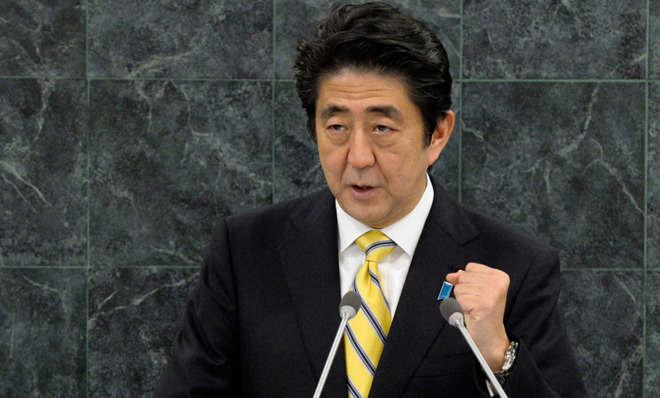Is Shinzo Abe trying to provoke a military confrontation between Japan and China?
The Japanese prime minister makes an unfortunate comparison to World War I

A free daily email with the biggest news stories of the day – and the best features from TheWeek.com
You are now subscribed
Your newsletter sign-up was successful
Amidst rising tensions between East Asia's two biggest powers, Financial Times journalist Gideon Rachmann tweeted this earlier from Davos:
That would be Japanese Prime Minister Shinzo Abe. And yes, that would be a reference to two large interdependent economies that in 1914 faced off in World War I.
Abe is best known for his daring economic policy, a three-pronged attempt — through fiscal policy, monetary policy, and structural reform — to pull Japan’s economy out of deflationary doldrums that have haunted the country for two decades.
The Week
Escape your echo chamber. Get the facts behind the news, plus analysis from multiple perspectives.

Sign up for The Week's Free Newsletters
From our morning news briefing to a weekly Good News Newsletter, get the best of The Week delivered directly to your inbox.
From our morning news briefing to a weekly Good News Newsletter, get the best of The Week delivered directly to your inbox.
But this is not all there is to Abe. He is also the leader of a resurgent nationalist movement that seeks to change a post-war order that has kept Japan a pacifist country under the security umbrella of the United States. Indeed, his economic and foreign policies are part of a broader agenda to reinvigorate Japan and assert its supremacy in a region that has been shaken by the rise of China.
Abe's nationalist agenda has taken different forms, ranging from symbolic acts to saber-rattling. He has mounted a vigorous denial of Japan's use of so-called "comfort women" during World War II; visited Japan's controversial Yasakuni Shrine, the spiritual home of scores of convicted Japanese war criminals; proposed the repeal of Article 9 of the Japanese constitution, which outlaws Japan from waging war; and played a game of chicken with China over a chain of tiny uninhabited islands in the Pacific known as the Senkaku islands to Japan, and the Diaoyu islands to China.
It is the dispute over those islands that has many observers nervous, with the potential to spark a wider conflict.
Japan has controlled the islands since 1895, except for a stint between 1945 and 1972, when they were under American control. China disputed the U.S. handover of authority to Japan in 1971, and has asserted a claim to the islands since then. The territory is close to critical shipping lanes and rich fishing grounds, and a 1968 American report suggested that there may be oil reserves in the area.
A free daily email with the biggest news stories of the day – and the best features from TheWeek.com
Some Chinese believe that China ought to counter Abe’s nationalist rhetoric by simply landing on the islands and planting a flag. Abe knows his remarks at Davos, along with his other actions, will be taken as provocations. So why does he do it?
For one, he knows that China is unwilling to disrupt economic relations with Japan, one of China's largest trading partners. Secondly, he knows that the U.S. still has Japan's back, and would never allow China to gain territory in what currently amounts to a U.S. sphere of influence. Abe can bolster his credentials back home as a hawk, while suffering few significant consequences.
In other words, Abe almost certainly has no actual intention of starting a fight. He does, however, have an interest in sounding tough.
Ultimately, it was not merely unwise to make the connection to World War I — it was also historically inaccurate. There was no global nuclear superpower balancing power between Britain and Germany in 1914, with the added economic leverage to discourage both sides from going to war.
John Aziz is the economics and business correspondent at TheWeek.com. He is also an associate editor at Pieria.co.uk. Previously his work has appeared on Business Insider, Zero Hedge, and Noahpinion.
-
 The ‘ravenous’ demand for Cornish minerals
The ‘ravenous’ demand for Cornish mineralsUnder the Radar Growing need for critical minerals to power tech has intensified ‘appetite’ for lithium, which could be a ‘huge boon’ for local economy
-
 Why are election experts taking Trump’s midterm threats seriously?
Why are election experts taking Trump’s midterm threats seriously?IN THE SPOTLIGHT As the president muses about polling place deployments and a centralized electoral system aimed at one-party control, lawmakers are taking this administration at its word
-
 ‘Restaurateurs have become millionaires’
‘Restaurateurs have become millionaires’Instant Opinion Opinion, comment and editorials of the day